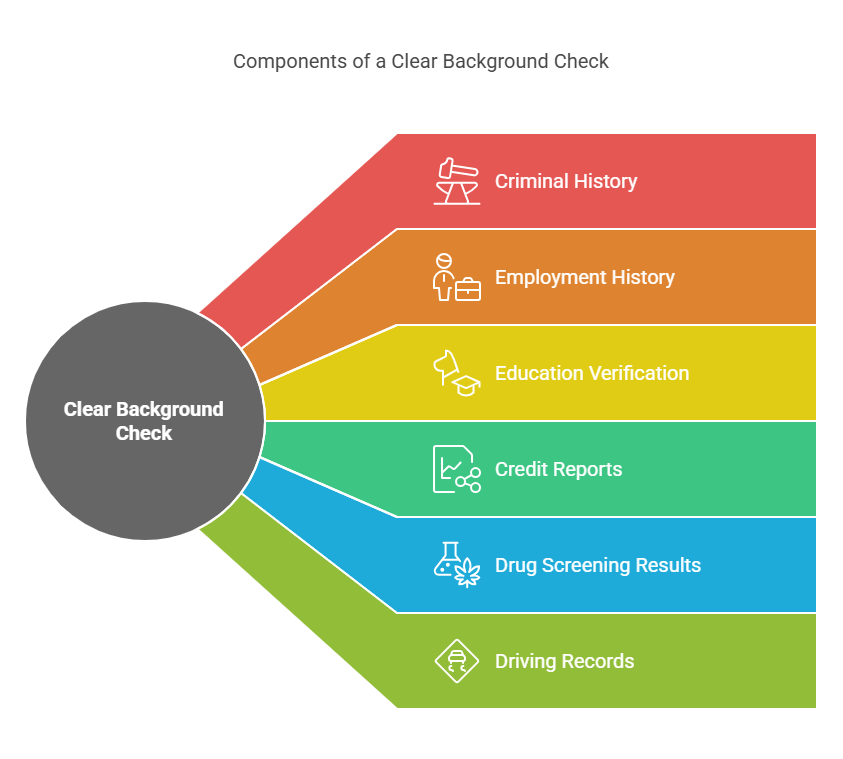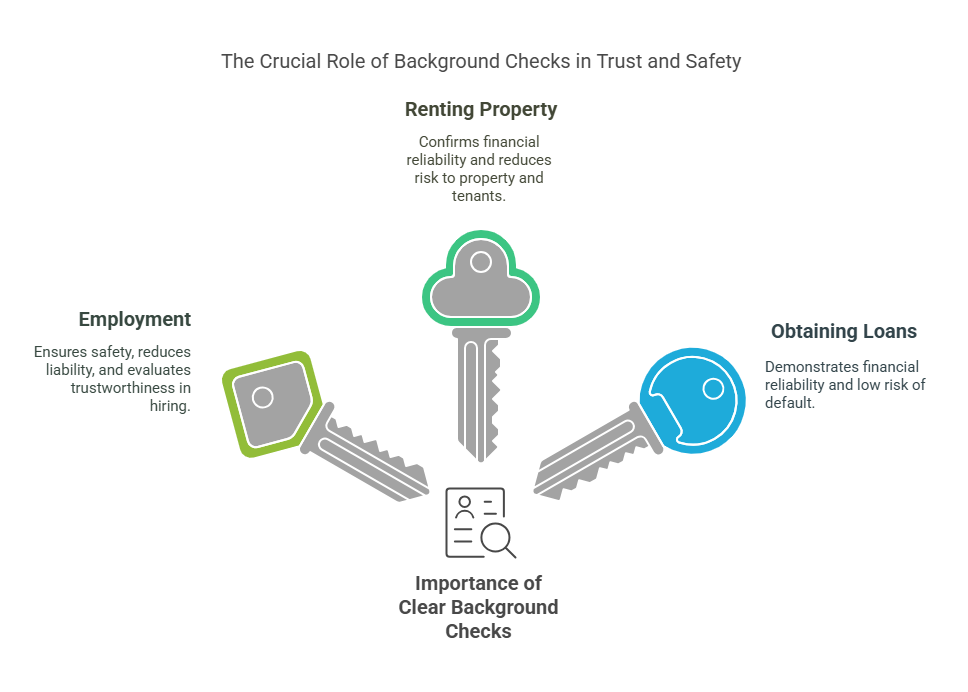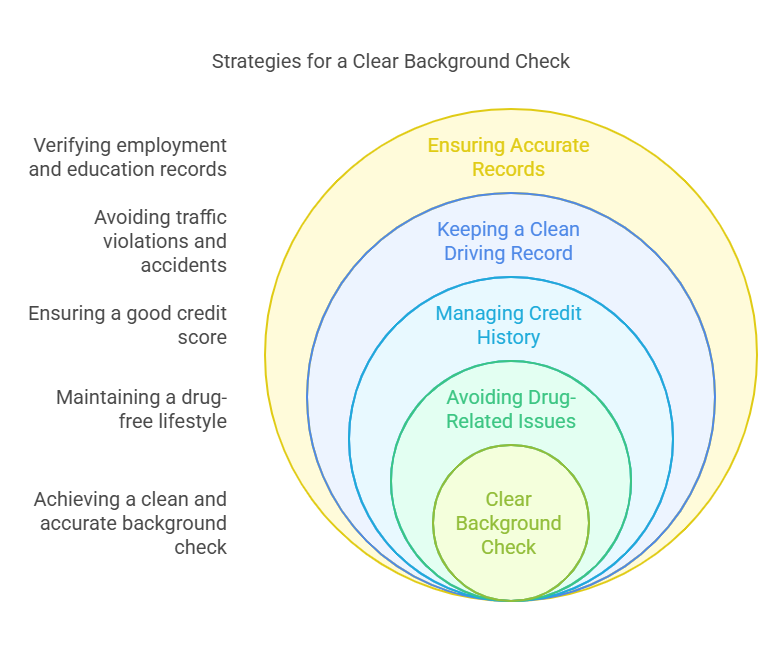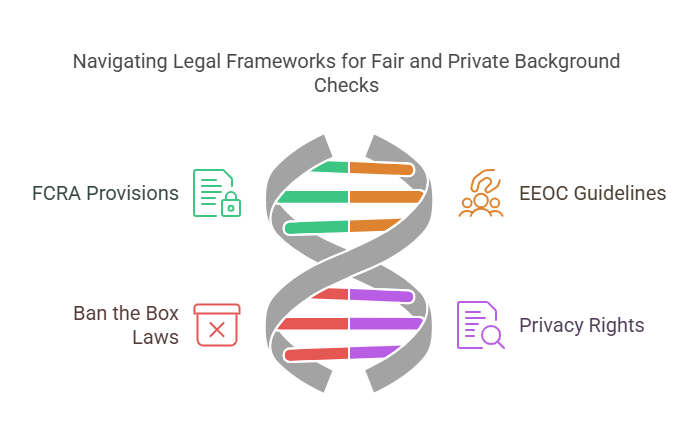The Importance of a Clear Background Check

What is a Clear Background Check?
A clear background check refers to a background screening process in which an individual has no disqualifying issues in any of the areas typically assessed by employers, landlords, or lenders. When someone passes a background check with no negative findings, it is often referred to as a “clean” or “clear” check. This can be particularly important for employment, renting, obtaining loans, or other situations that require a thorough evaluation of an individual’s history.
In this section, we will explain what constitutes a clear background check, the components that are included, and why it matters for various decision-making processes.
What Does a Clear Background Check Entail?

A background check typically involves several key components, each of which can reveal a range of information about an individual. Let’s explore what it means for someone to have a “clear” background check across these areas:
1. Criminal History
The most common and often most scrutinized part of a background check is the criminal history. Criminal checks will identify if an individual has any criminal convictions, arrests, or warrants. A “clear” criminal history means there are no felony convictions, misdemeanors, or pending criminal charges in the person’s record.
Common criminal history factors that could appear on a background check include:
- Felony convictions: Serious crimes, such as theft, assault, or fraud, which often result in long-term consequences.
- Misdemeanors: Lesser offenses, such as petty theft or simple assault, that may not be as severe but can still affect one’s background check.
- Arrest records: Individuals may have an arrest record even if they were not convicted, and while arrests may not always disqualify someone, they may still be considered depending on the nature of the offense.
A “clear” criminal background means no such offenses are present.
2. Employment History
An employment history check verifies a person’s past jobs, positions held, and the duration of employment. A clear employment history check means that the individual’s employment records are accurate and that they have been honest about their past positions. This check can reveal:
- Employment verification: Employers will verify the details of previous roles.
- Unexplained employment gaps: A history with no gaps or unexplainable periods of unemployment can indicate consistency and reliability.
- Fraudulent claims: A clear check ensures that the individual has not falsely represented their qualifications or job history.
3. Education Verification
Education verification confirms the schools or institutions an individual has attended, the degrees earned, and the dates of attendance. A clear education verification means:
- No discrepancies between what the applicant claims and the records from the institution.
- No history of fraudulent claims or degrees that were misrepresented.
Having an accurate and truthful education record is a significant part of a clear background check.
4. Credit Reports (In Certain Cases)
In some cases, a credit check is included as part of the background screening process, particularly for positions involving financial responsibility. A clear credit check means:
- The individual does not have unpaid debts, bankruptcies, or foreclosures.
- There is no evidence of credit fraud or identity theft.
- Good credit history, which may show responsible borrowing and timely payments.
For many employers, especially those in financial or managerial roles, a clear credit report is an essential factor for consideration.
5. Drug Screening Results
Some employers, particularly in industries where safety is a concern (e.g., transportation, healthcare), may include a drug screening as part of their background check. A clear drug test means the individual has not tested positive for illegal substances or drugs that could impair their ability to perform the job.
6. Driving Records
For jobs that involve driving or operating vehicles, employers may review a candidate’s driving history. A clear driving record indicates:
- No history of serious driving offenses (e.g., DUI, reckless driving).
- A clean driving history with no accidents or violations.
What is a “Clear” Background Check in Each Area?
To make it clearer, let’s summarize the different components of a background check and what would indicate a “clear” or “clean” record in each category:
| Component | What a Clear Record Means |
|---|---|
| Criminal History | No felony convictions, no misdemeanor offenses, no arrest records or pending charges. |
| Employment History | No discrepancies, honest representation of past roles, no unexplained employment gaps. |
| Education Verification | Accurate school records, truthful representation of degrees and dates attended. |
| Credit Report | No bankruptcies, late payments, collections, or fraud. Good financial management and timely payments. |
| Drug Test | No positive results for illegal substances or drugs. |
| Driving Record | No DUIs, no serious driving violations, no accidents or reckless driving incidents. |
Examples of Clear vs. Non-Clear Background Checks
- Clear Background Check:
- An individual has no criminal convictions, no arrest records, a steady employment history, good credit, and a clean driving record. This individual has passed all relevant background checks without any issues.
- Non-Clear Background Check:
- A candidate may have a minor criminal infraction from several years ago (e.g., a petty theft charge that did not result in a conviction), but this may still show up on a background check. This individual may still be considered for the job depending on the company’s policies, the severity of the offense, and the time elapsed since it occurred.
Why a Clear Background Check is Important

A clear background check is essential for various reasons, especially for employers, landlords, and lenders who rely on these checks to assess the integrity, trustworthiness, and suitability of candidates. Here’s why a clear background check matters:
1. Employment
For employers, a clear background check helps in:
- Reducing liability: Hiring someone with a clean criminal record and reliable work history reduces the potential risks to the company.
- Ensuring safety: In roles where safety is a priority (e.g., healthcare, transportation), employers need assurance that the individual doesn’t have a criminal record or dangerous driving history.
- Evaluating honesty and trustworthiness: A clear check can indicate that the applicant is truthful and responsible, especially regarding their employment and education history.
2. Renting Property
Landlords use background checks to ensure that potential tenants can pay rent on time and are unlikely to cause damage to the property. A clear background check in this case:
- Confirms a good credit history (indicating the ability to pay rent).
- Assures the landlord that there are no criminal records that could make the individual a risk to the property or other tenants.
3. Obtaining Loans or Credit
Lenders use credit checks to assess an applicant’s financial reliability. A clear credit report ensures that:
- The individual has a history of timely payments and a low risk of defaulting on loans.
- There is no evidence of fraud or other financial issues that would suggest the applicant is a high-risk borrower.
How to Obtain a Clear Background Check
The process of obtaining a background check begins when an individual or entity requests it. Below, we explain the steps involved in this process:
1. Understanding the Consent Process
Before a background check can be conducted, the individual must provide written consent. In many cases, this consent must be informed, meaning the person must understand what information will be collected and how it will be used. This consent is necessary to comply with laws like the Fair Credit Reporting Act (FCRA), which mandates that individuals must be informed and authorize a background check before it is conducted.
- Why consent matters: The consent protects the rights of the individual and ensures that no unauthorized checks are made.
- When consent is required: This is commonly requested by employers, landlords, and lenders before initiating a background check.
2. Information Needed for Background Checks
To run a background check, several key pieces of information are typically required from the individual:
- Full name (including any aliases or maiden names).
- Date of birth to verify identity.
- Social Security Number (SSN) (optional, but it helps improve the accuracy of the check).
- Current address and past addresses to verify residence history.
- Consent form or authorization to allow the check.
3. The Steps in Background Check Process
Once consent is given, the background check process typically unfolds in the following steps:
- Step 1: Selection of Background Check Service
The individual or company requesting the check chooses a background check provider, such as Precise Hire or other professional services. These providers ensure compliance with legal regulations while delivering comprehensive results. - Step 2: Data Collection
The background check service collects the relevant data from public records, employers, educational institutions, and other sources (with permission). - Step 3: Review of Results
After the check is completed, the service will provide the results to the requesting party, whether it’s an employer, landlord, or lender. These results may include criminal records, employment history, educational background, and more. - Step 4: Decision-Making
Based on the results, the requesting party makes a decision about the individual’s suitability for employment, housing, or credit. If no disqualifying factors are found, the person passes with a “clear” background check.
How to Improve or Maintain a Clear Background Check

While background checks are largely based on factual records, there are practical steps individuals can take to ensure their records are as clear as possible. Here are some strategies:
1. Resolving Legal Issues
If there is a criminal history that appears on your background check, consider taking steps to clear or resolve the issue:
- Expungement: If you have a criminal conviction, research whether you are eligible for expungement. Expungement can clear certain criminal records, effectively removing them from public view.
- Pardons: In some cases, obtaining a pardon from the court may reduce the negative impact of certain criminal convictions.
- Felony Reduction: Certain felonies can be reduced to misdemeanors, which could help improve your background check.
2. Ensuring Accurate Employment and Educational Records
Maintaining accurate and truthful employment and education records is essential:
- Verify employment history: Keep copies of your employment records, including past job titles, dates of employment, and performance reviews. If there is a gap in your employment, be prepared to explain it.
- Verify education credentials: Make sure your educational institutions have accurate records of your degrees, certificates, and other credentials. If you are unsure, request copies of your transcripts to keep your information up to date.
3. Keeping a Clean Driving Record
For jobs that involve driving, it’s important to maintain a clean driving record. This means avoiding:
- DUIs and reckless driving.
- Accidents and traffic violations.
If your record shows any violations, taking a defensive driving course or working to reduce points on your license can help improve your driving record.
4. Managing Your Credit History
A good credit score can significantly impact your background check, especially for positions in finance or roles requiring access to sensitive information:
- Pay your bills on time to avoid late payments that could negatively affect your credit score.
- Monitor your credit report regularly to ensure there are no inaccuracies or fraudulent activities.
- Work with a credit counselor if you find yourself struggling with debt or credit-related issues.
By staying on top of your finances, you can ensure that your credit report is clear of negative marks.
5. Avoiding Drug-Related Issues
If drug testing is part of the background check, you’ll need to maintain a drug-free lifestyle:
- If you’re concerned about potential drug use showing up in a test, refrain from illegal drug use and consider undergoing regular voluntary drug testing to ensure that your results are clean.
How Precise Hire Can Help
Precise Hire is a professional background check service that provides fast, reliable, and thorough background checks for businesses and individuals. They offer a variety of services that help ensure background checks are clear, including:
- Criminal record searches to identify any past convictions or arrests.
- Employment verification to ensure the information provided by the applicant is accurate.
- Drug testing to ensure compliance with workplace regulations.
- Secure, confidential screening to ensure that personal information remains protected.
- Fast turnaround times so that employers or individuals can make informed decisions quickly.
By using a service like Precise Hire, individuals and businesses can be confident that their background checks are not only clear but also fully compliant with relevant regulations such as the Fair Credit Reporting Act (FCRA).
The Importance of Using a Professional Service
When seeking a clear background check, it’s crucial to use a professional background check provider like Precise Hire. These services ensure that the check is done thoroughly, accurately, and in compliance with legal requirements. For businesses, using a professional service also helps avoid errors that could potentially lead to discrimination claims, which can be costly and time-consuming.
Key Benefits of Using Professional Services:
- Accuracy: Professional services ensure that all data is accurate and up to date.
- Compliance: They help maintain compliance with federal, state, and local regulations.
- Time-saving: Background checks are completed faster, enabling businesses to make timely hiring decisions.
- Confidentiality: Professional services ensure that all sensitive information is handled securely.
Legal Aspects of Background Checks

Background checks are governed by a variety of laws that ensure fairness, privacy, and equal treatment for individuals undergoing these checks. These regulations are designed to protect individuals’ rights while also allowing employers, landlords, and lenders to make informed decisions based on relevant background information. Below, we will examine some of the most important legal aspects related to background checks:
1. Fair Credit Reporting Act (FCRA)
The Fair Credit Reporting Act (FCRA) is one of the most significant laws governing background checks in the United States. The FCRA regulates how background checks are conducted and ensures that consumers’ privacy rights are protected. The key provisions of the FCRA include:
- Consent: Employers and other entities must obtain written consent from the individual before conducting a background check.
- Disclosure: If an adverse action (such as rejection for a job or loan) is based on the results of a background check, the entity must inform the individual and provide them with a copy of the report.
- Accuracy: The FCRA requires that background checks be accurate, and if an individual disputes inaccurate information, the reporting agency must investigate and correct the report within a specified period.
- Privacy: The FCRA also mandates that only relevant information be collected and shared during a background check. Personal data must be kept confidential.
2. Equal Employment Opportunity Commission (EEOC) Guidelines
The Equal Employment Opportunity Commission (EEOC) enforces federal laws that prohibit discrimination in the workplace. When it comes to background checks, the EEOC’s guidelines focus on preventing discrimination based on race, color, national origin, sex, disability, or religion.
Employers must ensure that their background check practices do not disproportionately affect certain groups. For example:
- Employers should avoid using background checks in a way that disproportionately excludes people of color or other protected groups unless the check is specifically related to the job.
- Employers should assess the relevance of criminal records or other factors to the position in question.
It’s important to note that certain criminal records may be excluded from background checks for positions that don’t require a high level of trust, such as minor offenses or records that are older than a certain time period.
3. Ban the Box Laws
Many states, cities, and local jurisdictions have implemented Ban the Box laws, which prohibit employers from asking about criminal history on job applications. These laws are designed to give individuals with criminal records a fair opportunity to be considered for employment without the stigma of a past conviction immediately affecting their chances.
- When to ask: Ban the Box laws generally allow employers to inquire about criminal history later in the hiring process—typically after a conditional offer of employment is made.
- Purpose: The aim of these laws is to give individuals with past criminal convictions the chance to showcase their qualifications and skills before being judged based on their criminal history.
4. Privacy Rights and Consent
In addition to the FCRA, privacy rights play a key role in the background check process. Individuals have the right to know what information is being collected about them, how it will be used, and to request copies of their background checks. Consent is central to ensuring that personal data is protected. Additionally:
- State-specific regulations: Different states may have specific rules about what can and cannot be considered in background checks (such as restrictions on considering criminal records for certain types of employment).
- Transparency: Individuals have the right to review and challenge any inaccurate or outdated information in their background check.
Employers and other entities conducting background checks must adhere to these laws to avoid legal ramifications, such as lawsuits or fines.
FAQs About Clear Background Checks
Here are answers to some frequently asked questions (FAQs) about background checks:
What does it mean if my background check is clear?
A clear background check means that there are no disqualifying issues found in your records. This typically means there are no criminal convictions, discrepancies in your employment or education history, or negative marks on your credit or driving records.
Can I still get a job if my background check shows a minor offense?
Yes, in many cases, a minor offense may not disqualify you from getting a job, depending on the nature of the offense and how long ago it occurred. Employers will generally consider factors such as:
- The relevance of the offense to the job you are applying for.
- How much time has passed since the offense occurred.
- Whether the offense was a misdemeanor or felony.
- Other factors such as your qualifications and work experience.
How far back do background checks go?
The length of time that a background check goes back can vary depending on the type of check:
- Criminal records: Typically, a background check will go back seven years. However, for certain jobs or industries, an employer may look further into your criminal history.
- Employment history: Employers may verify the past five to ten years of employment history.
- Credit checks: These typically look at your credit history for the past seven years.
What should I do if I have an issue on my background check?
If there is an issue on your background check, you have the right to dispute the findings:
- Check for inaccuracies: Review the report to identify any errors. If there is a mistake, you can request a correction.
- Seek expungement or pardons: If the issue involves criminal records, you may be eligible for expungement or a pardon to clear the record.
- Provide context: If you can’t have an issue removed, consider providing an explanation to the employer or other requesting entity.
Does a clear background check guarantee employment?
While a clear background check is an important factor in the hiring process, it does not guarantee employment. Employers will consider multiple factors, such as your qualifications, experience, and interview performance, before making a final decision.
What does it mean if my background check is clear?
A clear background check means that there are no disqualifying issues found in your records. This typically means there are no criminal convictions, discrepancies in your employment or education history, or negative marks on your credit or driving records.
Can I still get a job if my background check shows a minor offense?
Yes, in many cases, a minor offense may not disqualify you from getting a job, depending on the nature of the offense and how long ago it occurred. Employers will generally consider factors such as:
- The relevance of the offense to the job you are applying for.
- How much time has passed since the offense occurred.
- Whether the offense was a misdemeanor or felony.
- Other factors such as your qualifications and work experience.
How far back do background checks go?
The length of time that a background check goes back can vary depending on the type of check:
- Criminal records: Typically, a background check will go back seven years. However, for certain jobs or industries, an employer may look further into your criminal history.
- Employment history: Employers may verify the past five to ten years of employment history.
- Credit checks: These typically look at your credit history for the past seven years.
What should I do if I have an issue on my background check?
If there is an issue on your background check, you have the right to dispute the findings:
- Check for inaccuracies: Review the report to identify any errors. If there is a mistake, you can request a correction.
- Seek expungement or pardons: If the issue involves criminal records, you may be eligible for expungement or a pardon to clear the record.
- Provide context: If you can’t have an issue removed, consider providing an explanation to the employer or other requesting entity.
Does a clear background check guarantee employment?
While a clear background check is an important factor in the hiring process, it does not guarantee employment. Employers will consider multiple factors, such as your qualifications, experience, and interview performance, before making a final decision.
Conclusion
Understanding what constitutes a clear background check, how to maintain a clean record, and the legal considerations involved is crucial for individuals and businesses alike. A clear background check opens doors to employment, housing, and other opportunities, while ensuring compliance with legal and regulatory standards protects everyone involved.
Services like Precise Hire play a vital role in helping both individuals and companies navigate the complexities of background checks. With their help, individuals can ensure their background checks are accurate, complete, and compliant with laws, while businesses can make informed decisions based on reliable and legally compliant data.
By staying proactive, informed, and aware of your rights, you can ensure that your background check remains clear, allowing you to confidently move forward in your job search, housing applications, or other endeavors.
